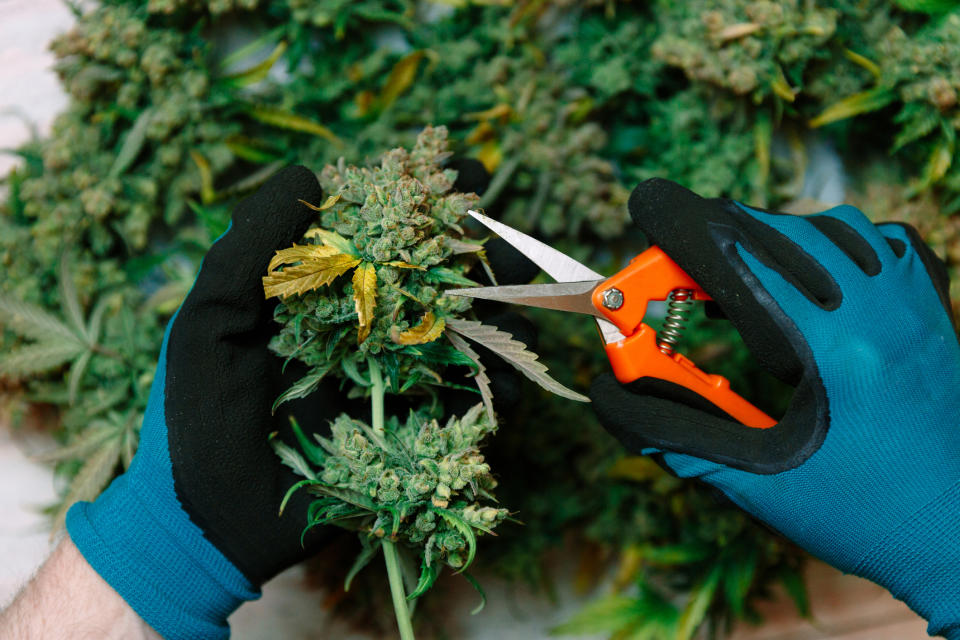Aurora Cannabis: 3 High-Risk, High-Reward Acquisitions to Consider
According to online investing app Robinhood, there isn't a more popular stock on the planet than Aurora Cannabis (NYSE: ACB). Data from the investing app that caters to 6 million investors, most of whom are millennials, shows that Aurora is the most-held stock, period! That makes it more popular than Facebook, Amazon.com, and even the almighty Apple.
Here's why retail investors love Aurora Cannabis
There are a number of factors that attract investors to Aurora Cannabis, with its production capacity, international reach, and focus on the medical marijuana community likely being the big three.

Image source: Getty Images.
On the production front, Aurora is outpacing all of its peers at the moment, with at least 150,000 kilos of annual run rate output. However, by the end of fiscal 2020 (June 30, 2020), Aurora expects to be on track for at least 625,000 kilos of yearly run rate production. This estimate assumes the completion of Aurora Sun, Exeter, and Aurora Nordic 2, as well as full licensing at these campuses. With few exceptions, no other pot growers even come close to matching Aurora's peak annual output.
Investors have also come to appreciate the company's focus on the international market. Including Canada, Aurora has a production, distribution, export, or research presence in 24 countries. Aside from Canopy Growth (NYSE: CGC) at 16 countries, there aren't any cannabis stocks within a stone's throw of Aurora's global reach. These external sales channels should prove especially valuable if and when dried flower oversupply hits the Canadian market in a few years.
There's also Aurora's mission, which, unlike many of its peers, tends to focus on the medical marijuana community. While not completely ignoring the fact that recreational weed offers a much larger patient pool, Aurora's management team understands that medical pot patients tend to use more frequently, buy more often, and are far more willing than adult-use consumers to purchase higher-margin derivative products, such as oils, edibles, topicals, vapes, and infused beverages. This makes focusing on medical patients a high-margin venture.
Three off-the-cuff acquisitions that might make sense for Aurora Cannabis
But we also know that -- following its 15 acquisitions since August 2016 -- Aurora loves inorganic growth. Aurora isn't afraid to pay hefty premiums to expand its reach, meaning it's probably more willing to take high risks with acquisitions if the potential reward is also great.
With this in mind, here are three high-risk, high-reward acquisitions that Aurora Cannabis could consider that might actually make a lot of sense.

Image source: Getty Images.
New Age Beverages
As recently as last week, I expressed my distaste for New Age Beverages' (NASDAQ: NBEV) stock. New Age, which owns a variety of ready-to-drink beverages and dietary supplements, announced plans to move into the nonalcoholic cannabis-infused beverage space last September, and its share price soared following the announcement. But a quick look at its existing line of non-cannabidiol (CBD) beverages, even after its $85 million cash-and-stock deal to combine with Morinda, isn't all that exciting. Sales have been relatively flat on an organic basis, and the company isn't expected to generate much in the way of profits.
But for a company with a $327 million market cap as of this past week, New Age Beverages would offer two things that Aurora Cannabis would find incredibly attractive. First, Aurora has made no secret that it would like to get into the nonalcoholic CBD beverage market (CBD being the nonpsychoactive cannabinoid best known for its perceived medical benefits). Although Aurora hasn't landed a brand-name beverage partner as of yet, and it does have billionaire activist investor Nelson Peltz signed on as a strategic advisor, buying New Age would give it access to a line of branded CBD beverages, thereby boosting portfolio diversity.
Maybe more important, acquiring New Age Beverages would give Aurora Cannabis access to Morinda's distribution network, which spans more than 60 countries. Even though not all of these countries allow cannabis products to be sold, this distribution infrastructure could prove golden for Aurora's future endeavors and ongoing push into new medical markets.
Aurora could also lessen the cost of the deal by potentially spinning out some of the non-CBD drink lines, since the distribution network and CBD beverages are the main lure here. While there are risks to diving into a crowded CBD beverage industry, purchasing New Age would offer its fair share of potential rewards.

Image source: Getty Images.
Aleafia Health
Another high-risk, high-reward acquisition opportunity for Aurora Cannabis to consider would be Aleafia Health (NASDAQOTH: ALEAF), which completed a transformative purchase of its own four months ago.
In March, Aleafia Health acquired Emblem in an all-stock deal. Both Aleafia Health and Emblem were running health and wellness clinics, as well as operating vertically integrated grow operations that controlled cannabis supply from seed to sale. In short, these were companies that would see medical patients, potentially prescribe medical marijuana to these patients, and hope to benefit from the higher margins and potential loyalty of these patients by selling them in-house-branded product. When the merger was complete, the new Aleafia Health had about 40 medical clinics and the ability to produce up to 138,000 kilos when at full capacity.
However, given its anemic $251 million market cap as of this past weekend, it's evident that Wall Street has some concerns about the company's business model. Namely:
At $0.95 per share, it's far too small to uplist to a major U.S. exchange.
Despite 138,000 kilos of peak output, it's still a ways from completing construction to yield this production.
A recent Australian export deal aside, it's unclear how Aleafia will find a home for 138,000 kilos of annual output.
This is where Aurora Cannabis could come into play. Aurora's focus on the medical marijuana community aligns perfectly with Aleafia's existing mission. More importantly, Aurora would be able to provide the branding and international opportunity that Aleafia sorely lacks at the moment. Not to mention, Aurora would further solidify its production lead by adding another 138,000 kilos of peak output.
There's obvious risk that Aleafia Health doesn't have the differentiating factors that make it worth buying. However, its medical-clinic model aimed at keeping domestic patients loyal to its network of high-margin cannabis products could be just what the doctor ordered for Aurora.

Image source: Getty Images.
iAnthus Capital Holdings
In mid-April, Canopy Growth shocked the investment world when it announced a $3.4 billion contingent-rights deal to acquire U.S. vertically integrated cannabis company Acreage Holdings. The cash-and-stock deal involved Canopy handing over $300 million upfront, with the remainder being paid in stock. The contingency of the deal is that the U.S. federal government has to legalize marijuana for it to occur, with a 90-month window from announcement for the deal to close.
Should the U.S. federal government reschedule or de-schedule marijuana, it would allow Canopy Growth to own a company with retail, growing, or processing operations in 20 states, which is more than any other cannabis retailer.
If Aurora Cannabis wants to consider rolling the dice in a similar fashion, the easiest way to do so might be with iAnthus Capital Holdings (NASDAQOTH: ITHUF). Earlier this year, iAnthus completed the more than $600 million all-stock acquisition of MPX Bioceutical. Today, it holds a maximum of 68 retail licenses that span 11 states. More specifically, iAnthus may be able to open up to 35 stores in Florida, while also maintaining a presence in California, Nevada, and Massachusetts, all of which should be billion-dollar markets by 2024.
At a current market cap of $447 million, iAnthus Capital provides a relatively inexpensive way for any Canadian grower to follow in Canopy's footsteps and set the stage for U.S. expansion, if and when the federal government changes its tune.
The risk? That comes in the form of iAnthus Capital's enormous goodwill, which stands at 555 million Canadian dollars, or 70% of the company's total assets. Aurora is no stranger to carrying around a high amount of goodwill on its balance sheet, but at 70% of total assets, the risk of a writedown should be considered reasonably high. Then again, buying iAnthus would be an easy way for Aurora to make a splash in the U.S. marijuana market.
More From The Motley Fool
John Mackey, CEO of Whole Foods Market, an Amazon subsidiary, is a member of The Motley Fool's board of directors. Randi Zuckerberg, a former director of market development and spokeswoman for Facebook and sister to its CEO, Mark Zuckerberg, is a member of The Motley Fool's board of directors. Sean Williams has no position in any of the stocks mentioned. The Motley Fool owns shares of and recommends Amazon, Apple, and Facebook. The Motley Fool has the following options: long January 2020 $150 calls on Apple and short January 2020 $155 calls on Apple. The Motley Fool has a disclosure policy.
